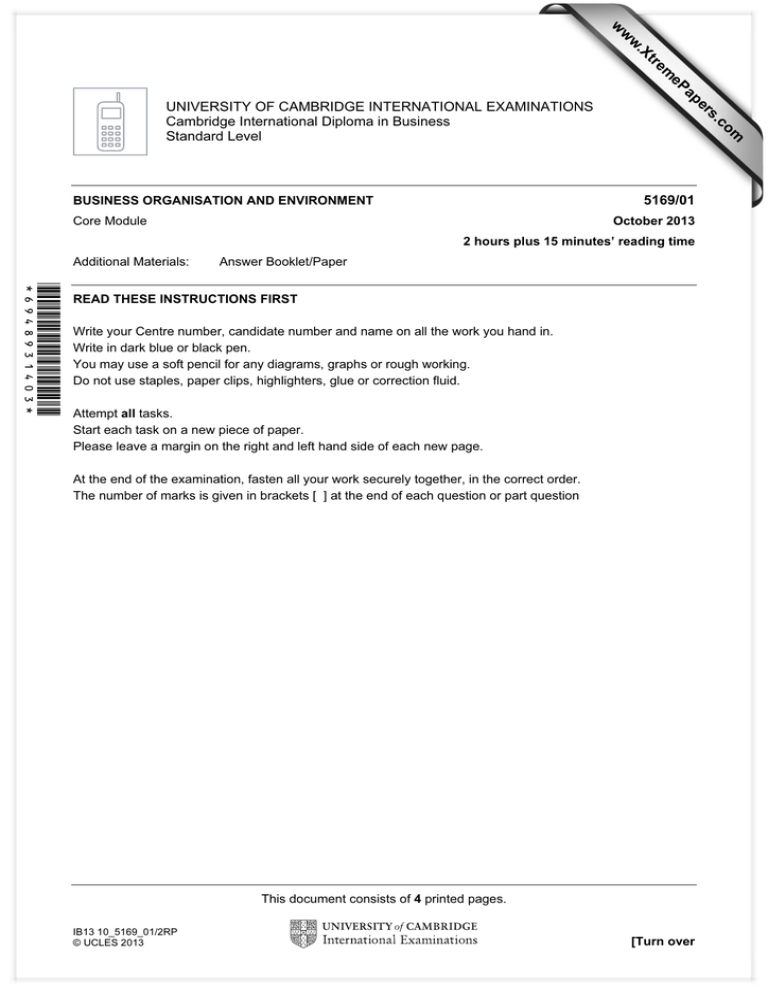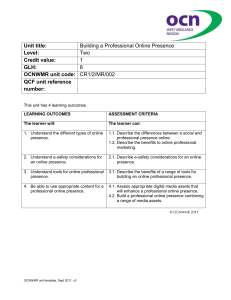www.XtremePapers.com
advertisement

w w ap eP m e tr .X w om .c s er UNIVERSITY OF CAMBRIDGE INTERNATIONAL EXAMINATIONS Cambridge International Diploma in Business Standard Level 5169/01 BUSINESS ORGANISATION AND ENVIRONMENT Core Module October 2013 2 hours plus 15 minutes’ reading time Additional Materials: Answer Booklet/Paper *6948931403* *2011* READ THESE INSTRUCTIONS FIRST Write your Centre number, candidate number and name on all the work you hand in. Write in dark blue or black pen. You may use a soft pencil for any diagrams, graphs or rough working. Do not use staples, paper clips, highlighters, glue or correction fluid. Attempt all tasks. Start each task on a new piece of paper. Please leave a margin on the right and left hand side of each new page. At the end of the examination, fasten all your work securely together, in the correct order. The number of marks is given in brackets [ ] at the end of each question or part question This document consists of 4 printed pages. IB13 10_5169_01/2RP © UCLES 2013 [Turn over 2 You must read the case study below and attempt ALL of the tasks which follow. (This case study is fictitious.) Green Lagoon Hotel (GLH) The Green Lagoon Hotel is situated north of Mombasa, Kenya, in a quiet rural area. It is owned by George Situma and he operates as a sole trader. His two daughters, Abla and Milina assist him in the running of the hotel. The hotel is located next to the beach and is popular with international travellers as well as with Kenyans. George bought the hotel about 20 years ago and has made many improvements over the years. It 5 has 55 rooms, a restaurant, two bars and an outside swimming pool. While the profitability of the hotel is important, George believes that this will only be achieved by offering a high standard of service to the guests. To ensure this high standard of service, George employs 42 full-time staff as well as his two daughters together with occasional use of casual staff. One of his objectives for next year is to increase the average number of rooms occupied per night, from its present 75% to 10 85%. At the same time he wants to maintain or improve the present levels of service. He believes in being very approachable and personally handles any complaints from the guests. He is an autocratic manager who likes to make all the important decisions himself, and closely supervises and controls his staff. He is particularly severe with any staff member who causes a customer complaint. 15 There are four departments in the hotel. The front office looks after reservations, reception and all administration, including bookkeeping, and is managed by Abla Situma. The restaurant and bars are managed by Milina Situma. The housekeeping department, which cleans all rooms and the public areas, is managed by a long term employee, Mary Baraza. The gardens, swimming pool and all other external areas are managed by Collins Ochieng, who also has worked for the hotel for 20 many years. All other staff report directly to these four managers, except in the kitchen where the head chef reports to Milina and the other kitchen staff report to the head chef. Generally there is quite a wide span of control. The hotel enters into contracts with foreign travel tour operators and this provides a guaranteed room occupancy of about 50%. George does not want to increase these contracts as he believes 25 that too much reliance on a few contracts would weaken his reputation and his ability to negotiate good prices. Many customers like to combine a safari holiday with a stay at a beach hotel. In order to make this easier for customers and to increase his sales, George has entered into an agreement with the owners of a safari lodge. Customers can pay one inclusive cost for a week’s stay at his hotel and a week at the safari lodge, with transport between the two included. This has proved very 30 popular and he is thinking of also offering a shorter holiday of four days at his hotel and three days at the safari lodge. © UCLES 2013 5169/01/O/13 3 You must attempt ALL of the following tasks. Where appropriate use information from the case study to support your answer. 1 (a) GLH operates in the tertiary sector. State the sector in which each of the following suppliers to GLH operate. (i) Mombasa Farms Ltd which supplies them with fresh food grown on their own farms. [2] (ii) Blue Pools Ltd which maintains the swimming pool every week. [2] (b) Profitability and good service are two objectives of GLH. Describe two further objectives that George might set for the next 12 months. [2 x 2 = 4] (c) At times, GLH suffers from a shortage of working capital. Define working capital and suggest actions that George could take to improve his working capital position. [6] (d) George is thinking of changing from a sole trader to a limited company. He would own 50% of the shares and his daughters would own 25% each. Explain the advantages and disadvantages of this change. [6] [Total: 20] 2 (a) Describe the advantages of GLH having a wide span of control throughout most of the organisation. [4] (b) Reservations for the hotel are handled by the front office. Explain why it is important that the front office communicate clearly with housekeeping. [4] (c) The housekeeping department does not produce revenue. Discuss how target setting could help the department become more efficient. [6] (d) Explain three probable effects on staff of George being an autocratic manager. [3 x 2 = 6] [Total: 20] 3 (a) Describe the advantages to GLH of employing some casual staff. [4] (b) Explain one advantage and one disadvantage of job sharing for waiters and waitresses in the restaurant. [2 x 2 = 4] (c) George expects his staff to be punctual. Describe three other expectations George might have of his staff. [3 x 2 = 6] (d) Explain why the possibility of promotion may be important to the staff. [6] [Total: 20] © UCLES 2013 5169/01/O/13 [Turn over 4 4 (a) Explain the advantages to George of spending money on training for his staff. [4] (b) The location on the beach is an important advantage to GLH. Describe what disadvantages they might have in being in an area away from any towns or cities. [4] (c) Explain why the government would want to encourage tourism and support George’s business. [6] (d) Explain what effect a world recession could have on GLH. [6] [Total: 20] 5 (a) Describe how GLH could promote itself in international markets. [4] (b) Describe how GLH could segment its market in order to increase sales opportunities. [4] (c) Explain the importance of price in the marketing mix of GLH. [6] (d) Explain why the link with the safari lodge might give GLH a competitive advantage. [6] [Total: 20] Permission to reproduce items where third-party owned material protected by copyright is included has been sought and cleared where possible. Every reasonable effort has been made by the publisher (UCLES) to trace copyright holders, but if any items requiring clearance have unwittingly been included, the publisher will be pleased to make amends at the earliest possible opportunity. University of Cambridge International Examinations is part of the Cambridge Assessment Group. Cambridge Assessment is the brand name of University of Cambridge Local Examinations Syndicate (UCLES), which is itself a department of the University of Cambridge. © UCLES 2013 5169/01/O/13





